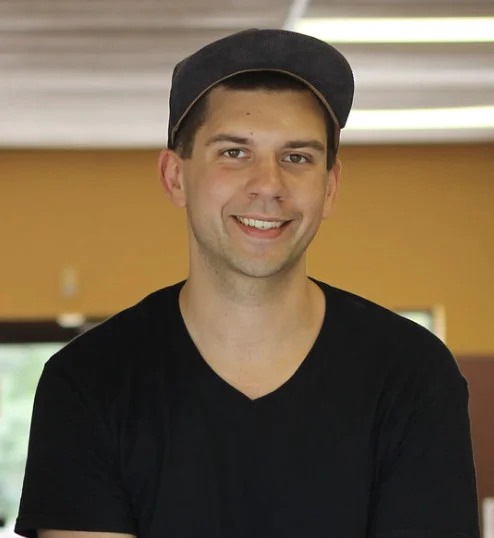5 Questions with Roy Power
The endearing, nostalgia-inducing documentary, “Memory Video,” profiles the last video store owner in Philadelphia, as he deals with being an holdout for physical media in an age of streaming. We asked director Roy Power how the project started, how he approached the film’s structure, and a recent film he’s loved…
1) Can you talk briefly about your background, and how you first got interested in filmmaking?
I've basically been obsessed with movies since I was a little kid. I started with Jurassic Park, and eventually worked my way to Taxi Driver and Cool Hand Luke... which opened a whole world for me. I made fun little short films, skits, and commercials with my friends all through high school. I went to college for business, for some reason, got some video & film part-time jobs as a student, and then immediately left after 4 years wanting only to make movies. Right after college I began work as an editor at a small production studio in Rhode Island, Animus Studios. While at Animus, I've directed a couple music videos for Philly-based rock band Low Cut Connie, and then Memory Video as sort of my official directorial debut, beyond music videos.
2) What’s the backstory here? How did you meet Miguel, and did you have a personal connection/experience with Viva Video before you embarked on the project?
The idea for Memory Video came before I knew that Miguel existed - I wanted to make a short film that expresses the feeling and excitement of going to the video store, something I fondly remembered as a kid. I was mainly inspired by Tom Roston's book I Lost It at the Video Store, which included lots of great interviews of now-famous directors talking about the joy of just hanging out there, and browsing the aisles for hours. I started to research which video stores still existed, and found more than I expected. I met up with and interviewed many owners of video stores, and even shot a whole weekend at a video store - but the material just wasn't working for me, so we scrapped. When I found Miguel through some online interviews, I knew he was the guy. He seemed so genuine, cool, personable. So I gave him a call, pitched my idea to him, and he was all in, right away. If I didn't find Miguel, I doubt Memory Video would have been finished. He really carries the short, he's the nicest guy you'll ever meet and the perfect character.
3) Can you talk a bit about you approached the structure and filming of this. Like, did you have a shape in mind before you began, or were you just following the lead of your interviews? Were their any particular obstacles you had to avoid in production, or editing?
Right from the start, I wanted the structure and style of this to be loose and fun, but also not too fast paced or overwhelming with nostalgia. So it was tough getting a balance of these contradictory things, which really came together when editing with Murphy, our editor. I wanted to be able to hop from fairly standard talking head interviews, to dreamy period-piece flashbacks, to a VHS movie-within-a-movie, to stylized neon shots, in as little time as possible - around 8 minutes was always the goal. A lot of short films are very serious, and I wanted this one to be fun, with a low-stakes subject matter, and a bit stylistically unpredictable, without going overboard in style.
As far as the interview goes, I literally scripted the whole movie based on what Miguel had already said in print interviews online. I then added some of my own words. I really wanted to get a sense of the story flow and subjects before shooting the interview, since we were limited on time. After having a script, I worked backwards and tore it down into more open-ended questions, because I would never want to put words in Miguel's mouth. Then, we let him role with it, to allow freedom to say what he wanted to while still keeping a story structure in mind. At times, I'd just tell him "No - say what you did in that interview instead!". He got a kick out of that.
One major change was the mindset of us going to Philadelphia and shooting a lot of "isolated" scenes, of Miguel sitting alone at diners and such, to get a sense of a "Miguel against the world" feeling of being one of the few holdouts of running a video store. Not only did I realize that this was pretty corny and heavy-handed, but as soon as we arrived, it was obvious that Miguel is the exact opposite of a lonely person. We ended up focusing much more on shooting him together with his family and customers. I think that made the short so, so much better than it would have been. The sense of community a video store brings people is what this was all about in the first place.
4) What’s a film you’ve seen recently, new or old, that you really loved and why?
I've been watching all of Jonathan Demme's movies in order - I'd have to go with Philadelphia. Understated performances, beautiful bookending songs by Bruce & Neil Young, unique and emotional close-ups, and just the right amount of style without ever distracting from a nearly perfect script. I put this off for so long expecting an Oscar-bait drama, but I was completely wrong.
5) What’s next for you?
Next up is Trash TV. It's a drama-comedy about the hosts of a local television station: a raunchy talkshow host, a reality TV bounty hunter, and a televangelist. I'm starting it as a series of short films, including a world-building music video, that I plan to eventually build into a feature-length film.


